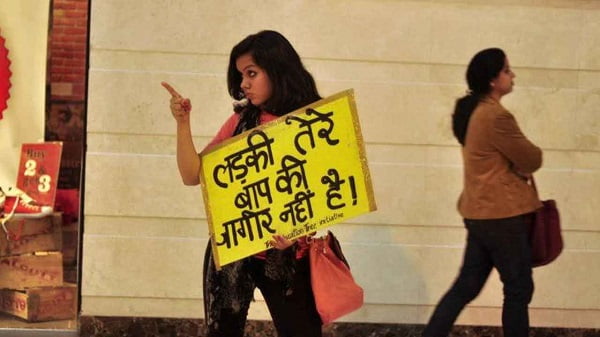Posted by Sahla Nechiyil
The Facebook list with the names of sexual predators in academia, unveiled last year, had broken the silence around sexual harassment on campuses. It also brought the fairness of complaints’ committees under the scanner. While the uproar got news media to pay attention to the issue, Newslaundry launched an exhaustive series to probe the state of redressal mechanisms and their functioning on college campuses across the country.
As part of this series, we interacted with Delhi University (DU) students from various colleges. The puzzled responses from students made us realise that a large chunk of them barely knew that sexual harassment complaints committees were mandated by the University Grants Commission (UGC). The situation was no different across colleges including Ramjas, Kirori Mal and Miranda — all of whom claim to have complaints’ committees that enjoy credibility and have a history of fighting against harassment.
We dug deeper to ascertain how serious the university was — with 77 affiliated colleges and two-and-a-half lakh students — addressing incidences of sexual harassment on campus. It was disappointing to find that there are only a handful of institutions affiliated to the university that followed due process while a majority of them shirked responsibility as they blamed the poor state of the complaints’ committees on the trashing of Ordinance 15(D) in 2013.
Ordinance 15(D): Prohibition and Punishment for Sexual Harassment was a policy implemented in DU and aimed to create a sexual harassment-free environment. Considering the ways in which power relations function in colleges and the university, the ordinance ensured that complaints’ committees were independent of individuals with executive authority.
Ordinance 15(D) ensured that complaints’ committees were independent of individuals with executive authority.
However, the 2003 policy was scrapped in the wake of Sexual Harassment of Women at Workplace (Prevention, Prohibition and Redressal) Act, 2013. Consequently, the UGC sent out a notification in 2016 insisting that all Higher Education Institutions (HEIs) should form an Internal Complaints Committee (ICC) to address sexual harassment on campus.
Research findings
Although the UGC regulation insists: “Every Executive Authority shall constitute an Internal Complaints Committee (ICC) with an inbuilt mechanism for gender sensitisation against sexual harassment,” the majority of colleges in DU have a different story to tell.
Out of 77 colleges, 23 didn’t respond to our repeated calls and emails. Among the rest, 53 colleges have complaints’ committees in place while one college, Ram Lal Anand College, doesn’t. Notably, when asked if the college adhered to UGC guidelines, we got a ‘yes’ from all 53 colleges. Nevertheless, further probes into the state of these committees revealed a contrary picture.
The ICC constitution insists on certain measures to make the ICC accessible to students, such as “publicly notify the provisions against sexual harassment and ensure their wide dissemination… display prominently at conspicuous places on notice boards the penalty and consequences of sexual harassment, contact details of members of the Internal Complaints Committee and complaints’ procedure.” The constitution also insists: “The process of filing a complaint against sexual harassment in a university and the details of the law” be displayed as well.
Newslaundry’s investigation revealed that out of 54 colleges, three colleges (Aryabhatta College, Lady Hardinge Medical College and Netaji Subhas Institute of Technology) neither have complaint boxes nor flex hoardings on their campus. Another set of five colleges do not display the names of committee members on their official website while seven others have an outdated list of members’ names. Meanwhile, 27 colleges haven’t published the contact numbers of their members. While one college (Keshav Mahavidyalaya) has given only the presiding officer’s email address, another (Deshbandhu College) only displayed the presiding officer’s phone no.
Also Read: Why The Disbanded GSCASH In JNU Needs To Be Reconstituted | #MakeMyCampusSafe
The ambiguity regarding the election of student representatives to the committee has been considered a major reason for students’ ignorance about the ICC. Although the ICC clause states that “three students, if the matter involves students, who shall be enrolled at the undergraduate, master’s, and research scholar levels respectively,” should be “elected through transparent, democratic procedure,” it doesn’t mention how the election should be conducted. This is a serious lapse on the part of the college administration.
The Newslaundry investigation revealed that 25 college committees were devoid of student representatives. Out of 25 colleges, 11 told us that they consider their students’ union members as ICC members, whenever required. That means only 14 colleges have elected student representatives on their committees.
Let us now look at one of the most important clauses in the ICC constitution: “One-half of the total members of the ICC shall be women.” In DU, committees in three colleges (P.G.D.A.V. College, Shaheed Sukhdev College of Business Studies, Netaji Subhas Institute of Technology) violate this vital clause. Although the UGC regulation insists every institute “make the students aware of the ICC and assist in sensitisation programmes,” there are only 18 colleges which hold sessions on sexual harassment during their orientation.
The need for urgency
While interviewing students in Ramjas College, a girl shared that she was sexually harassed during her first year in college. When asked why she didn’t complain, the student said, “Because he is on a good post,” breaking into tears. The element that deterred her from taking on the harasser was the tyranny of authority. This reiterates the notion that “sexual harassment is an act of power” and the power relations that exist in university spaces make students vulnerable to harassment.
This testimony shows the need to understand power nuances and that’s exactly why the following clauses in ICC become important: “Orientation courses for administrators conducted in HEIs must have a module on gender sensitisation and sexual harassment issues. Regular workshops are to be conducted for all sections of the HEI community”. Also, “organise training programmes or as the case may be, workshops for the officers, functionaries, faculty and students.”
The Newslaundry investigation revealed that 25 college committees were devoid of student representatives.
Another thing that stands out from our interactions with students is how gender stereotypes condition men. This, in turn, makes it difficult for male students to recognise incidences of harassment, including cases where they are subjected to harassment. “We need to ask ourselves what does and does not constitute sexual harassment — and that question isn’t easy to answer,” said Tara Amrapaly, an ICC member from Kirori Mal College.
One of the clauses in the ICC constitution recognises this complexity in defining sexual harassment and states: “Wherever required, appropriately subsume the spirit of the above definitions in its policy and regulations on prevention and prohibition of sexual harassment against the employees and the students and modify its ordinances and rules in consonance with the requirements of the regulations.”
During our conversations with presiding officers, it was emphasised that ICCs are not gender neutral in terms of addressing complaints. Meaning, they do not cater to the complaints put forward by male students or the third gender.
This, however, is not in line with what the ICC constitution states. “Act decisively against all gender-based violence perpetrated against employees and students of all sexes recognising that primarily women employees and students and some male students and students of the third gender are vulnerable to many forms of sexual harassment and humiliation and exploitation,” and “vulnerable groups are particularly prone to harassment and also find it more difficult to complain. Vulnerability can be socially compounded by region, class, caste, sexual orientation, minority identity and by being differently abled. Enabling committees must be sensitive to such vulnerabilities and special needs” – showing ICCs to be gender neutral on paper.
Unfortunately, the current understanding of ICCs in terms of inclusivity of complaints filed by male students does not adhere to the clauses in the constitution. “We would need to fight for it because at the moment it is understood to be only for women,” said Vinita Chandra, a faculty member at Ramjas, when the aforementioned clauses were pointed out. Although things have started changing with Delhi University’s insistence that all colleges have ICC students’ election, faculty members remain unsatisfied with the current lack of independence of ICCs and the authority to the college administration to nominate members.
Also Read: In Conversation With Dr Vinita Chandra: On Sexual Harassment And ICCs On Campus | #MakeMyCampusSafe
This piece is part of our series #MakeMyCampusSafe in collaboration with Newslaundry.
Featured Image Source: She The People TV
About the author(s)
Guest Writers are writers who occasionally write on FII.




